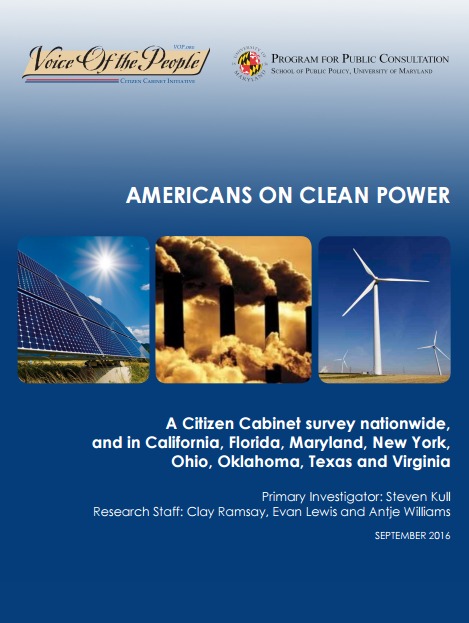As litigators prepare oral arguments for the 24-state suit to stop the federal government from implementing the Clean Power Plan (CPP), a Citizen Cabinet survey has found that two-thirds of registered voters in the states party to the suit – 67% to be exact – actually favor the CPP.
The report surveyed eight states, including four that are party to the lawsuit. In all four – Florida, Ohio, Oklahoma and Texas – two-thirds or more support the plan. Across the country as a whole, 69% approve of the CPP, with similar majorities in key swing states surveyed.
The CPP seeks to reduce greenhouse gases from power plants 2% to 3% a year. The District of Columbia Circuit Court of Appeals is scheduled to hear arguments on Sept. 27.
The in-depth national survey, which also includes statewide samples in California, Florida, Maryland, New York, Ohio, Oklahoma, Texas and Virginia, was conducted by the Program for Public Consultation, School of Public Policy, the University of Maryland (PPC) and released by the nonpartisan group, Voice Of the People.
“Clearly, the forces driving this lawsuit are not arising from public resistance to the Clean Power Plan,” said PPC Director Steven Kull.
Interestingly, even among respondents who work in the coal industry or have family members that do, 62% support the CPP.
However, support was not bipartisan. Nationally, only 47% of Republicans are in favor, and a slight majority of 52% oppose the plan. Among Democrats, 89% approve, as do 64% of independents.
Notably, if the federal government were to make efforts to mitigate the effect of the CPP on coal workers – either by providing support for coal industry workers who lose their jobs or providing support to the coal industry by enabling it to sequester carbon dioxide – support increases to a bipartisan majority, rising to 61% among Republicans, 94% among Democrats and 78% overall.
Between these methods, providing support for coal industry workers who lose their jobs is far more popular (overall 73%, Republicans 68% and Democrats 80%) than providing support for carbon sequestration (overall 48%, Republicans 44% and Democrats 46%).
There is bipartisan majority support, though, for specific measures to reduce carbon dioxide. Support for providing tax credits for installing fuel-efficient lighting, doors, windows and insulation; building new energy-efficient homes; and installing wind and fuel cells (overall ranging from 73% to 78%) ranges from 62% to 69% among Republicans, while Democratic support ranges from 84% to 87%.
Bipartisan majorities also favor requiring higher fuel efficiency standards for light cars and trucks and heavy-duty vehicles and requiring electric companies to have a minimum portion of their electricity come from renewable sources (overall 71% to 74%). Republican support for these ranges from 56% to 57%, while for Democrats, it ranges from 84% to 89%.
The CPP is central to the U.S.’ commitment to the Paris Agreement, by which the U.S. has agreed to pursue the goal of reducing its greenhouse gases by 26% to 28% below 2005 levels by 2025 – or about 2% per year.
Seventy-one percent of American registered voters approve of participating in the agreement. Among Republicans, a slim majority (52%) approve, but 61% say the agreement is at least tolerable. Democrats overwhelmingly approve (89%), as do independents (66%).
According to the report, support for reduction of carbon dioxide appears to be driven by concerns about the health effects of air pollution as much as or more than concerns about climate change. Seventy-four percent say that it should be a high priority to reduce air pollution from energy production (Republicans 51% and Democrats 93%). Seventy percent nationally say it should be a high priority to reduce greenhouse gases (Republicans 44% and Democrats 91%).
Citizen Cabinet surveys take respondents through an online process called a “policymaking simulation” that seeks to put them in the shoes of a policymaker, giving them essential information and presenting key arguments on both sides of each issue.
The full report can be found here.




